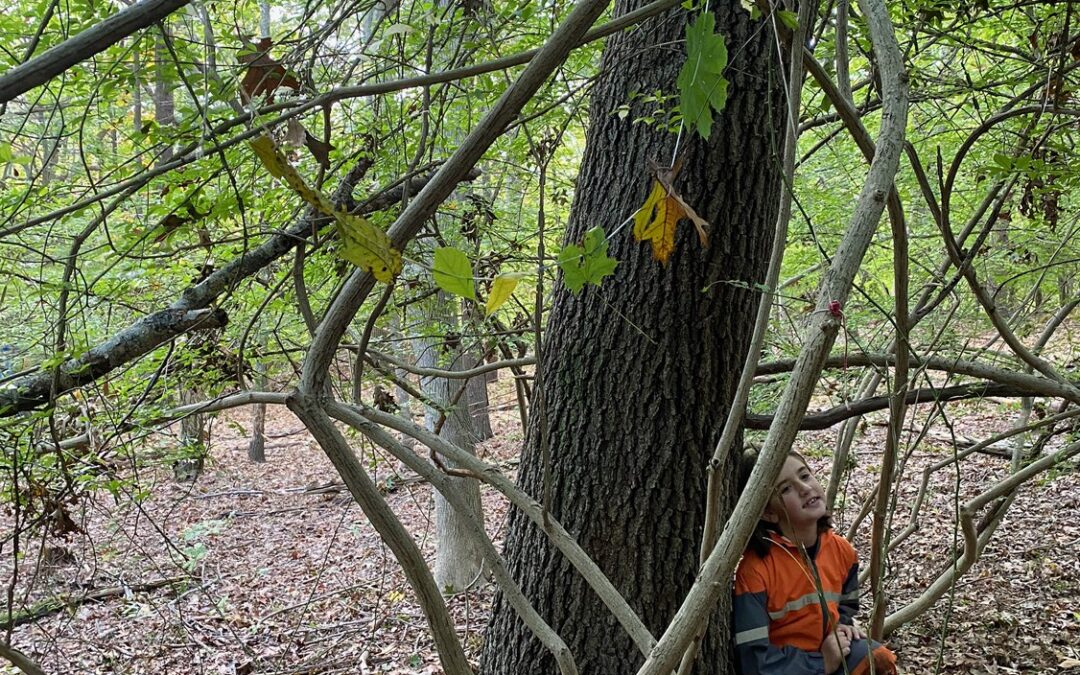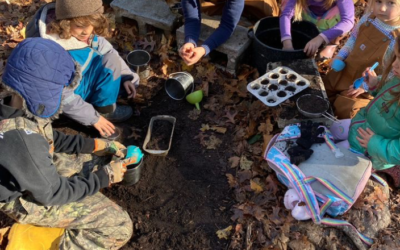Raising the Next Generation of Earth Stewards

“We could have never loved the Earth so well if we had no childhood in it” – George Eliot
“Take Care of Mama Earth” is our third guiding principle at Aishling Forest School. We encourage our learners to do so in very simple ways, like practicing “leave no trace” at our home in the woods, and not intentionally harming any plants or animals. From moment to moment, one can imagine a myriad of ways to teach children how to take care of Mama Earth – but it is simply amazing and even deeply relieving and validating to witness this guiding principle innately unfold, unprompted, from within the hearts and souls of the learners.
Biophilia refers to the innate human desire to connect with and care for nature. The biophilia hypothesis suggests that because we have an innate love of nature, our health and happiness suffers without it. Further than that, there is a wide-body of research suggesting that experiences in nature during early childhood encourage environmental stewardship in later life.
Could it be that just as much as humans have an innate longing for nature, Mother Earth has an innate longing for us (to take care of her), as well?
Although biophilia was used by the German-born psychoanalyst, Eric Fromm, as early as 1973, it wasn’t until 1984 that the term was used by American biologist Edward O. Wilson to describe the genetic basis of nature-connection. Studies conducted as early as 1978 concluded that “children must develop a sense of respect and caring for the natural environment during their first few years of life, or be at risk for never developing such attitudes” (Stapp, 1978; Tilbury, 1994; Wilson, 1994). While these findings might seem to contradict the biophilia hypothesis – because the biophilia hypothesis suggests that the sense of respect and caring for nature is innate, not something that needs to be learned and developed – it is important that the trait is well-nurtured and encouraged to grow. This is because children’s value systems and perceptions of the world are formed within the first seven years of life. In order to take action to care for the Earth, we have to care enough to actually do so!
 At Forest School through free play, our learners build on the understanding of our connection with nature. We overhear conversations like, “It makes Mother Earth soooo happy when we climb and play on her!” We watch the children make offerings of “food” and “medicine” to Mama Earth of mud pies and berries. We witness the children practice their discernment about how to care for Mama Earth when they decide not to snap a living tree branch, or not to harvest too many leaves from a plant. We feel them acknowledging and caring for the Earth as a living, breathing being. These instances might seem small – but this process of learning fosters empathy and understanding of interconnection. Our learners are empowered and allowed to reflect and understand how their actions affect themselves, others, and the natural world.
At Forest School through free play, our learners build on the understanding of our connection with nature. We overhear conversations like, “It makes Mother Earth soooo happy when we climb and play on her!” We watch the children make offerings of “food” and “medicine” to Mama Earth of mud pies and berries. We witness the children practice their discernment about how to care for Mama Earth when they decide not to snap a living tree branch, or not to harvest too many leaves from a plant. We feel them acknowledging and caring for the Earth as a living, breathing being. These instances might seem small – but this process of learning fosters empathy and understanding of interconnection. Our learners are empowered and allowed to reflect and understand how their actions affect themselves, others, and the natural world.
Storytelling + Storyacting: A Powerful Tool For Children
“Storytelling is the most powerful way to put ideas into the world today.”- Robert McAfee Brown So some may wonder, why is storytelling so crucial to children’s development and how can we encourage the practice with them? “Storytelling connects your child to...
What is Friluftsliv and Can It Make Us Healthier, Happier and More Creative?
"Friluftsliv isn't something you can touch. It's something you feel in your soul."– August Casson Friluftsliv (pronounced FREE-loofts-liv) or “open-air life” is a big part of Aishling Forest School’s outdoor pedagogy and is a centuries-old Nordic tradition of...
How Forest School Nurtures Brain Development
“When we help a child to feel secure, feel appreciated, feel that “somebody is deeply, truly interested in me,” by the way we just look, the way we just listen, we influence that child’s whole personality, the way that child sees life.” – Magda Gerber It is...




